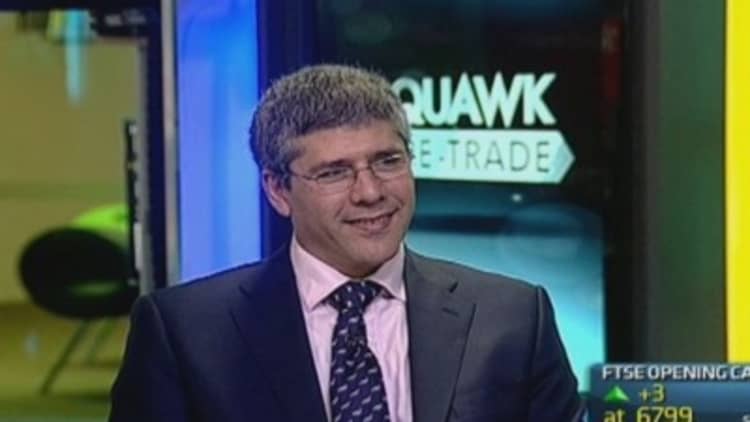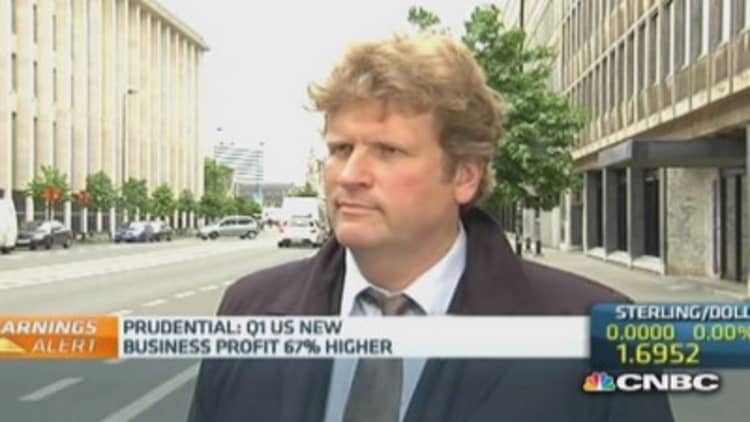
Betting on euro weakness is the only trade that will make investors money this year as the European Central Bank contemplates quantitative easing (QE), HSBC's head of FX strategy told CNBC, amid fierce debate about the level of the single currency.
The comments came ahead of the closely-watched European Central Bank (ECB) meeting on Thursday, in which the policy makers left the benchmark interest rate on hold at 0.25 percent.
ECB president Mario Draghi has expressed concern that the strong euro is weighing on prices and leading to disinflation in the euro zone. French finance minister Michel Sapin echoed the views in an interview with CNBC saying the level of the euro needs to be debated.
The euro rose to a two-month high against the dollar hitting $1.3960 after the ECB's decision, although fell back when Draghi hinted at possible policy action next month. Despite this slide, the euro is up over 0.9 percent against the dollar over the year to date.
Read MoreEuro zone deflation risks low: European Commission
While euro/dollar bears have continued to be stumped by the single currency's strength - which has seen a 6.1 percent rally against the greenback in the past 12 months – HSBC's head of FX strategy David Bloom, said the ECB will eventually have to introduce QE which will push the euro lower.
"They are going to do something at some point and one thing that was bought up is, if they do QE will the euro go down? Well if it doesn't, QE ain't working because the mechanism by which QE works is a weaker currency that is one of its prime mechanisms so if you do QE and your currency doesn't go down, you've failed," Bloom told CNBC in a TV interview.
"The market thinks this is going to be the big ticket ride so when they do QE the euro goes down and we're all sitting there waiting because this is the only thing in FX we're going to make money on this year."
Euro strength
Draghi has always reiterated the fact that the central bank stands ready to act with unconventional policy measures to tackle deflation. In November, the ECB slashed its benchmark interest rate to a record low of 0.25 percent from 0.5 percent.
Read MoreECB to buy time with words not deeds
Inflation picked up in April rising to 0.7 percent, up from March's 0.5 percent figure giving Draghi some breathing space, but is still well below the ECB's 2 percent target.
The euro has been buoyed by an improving economic picture in the euro zone which has seen some of the worst-hit countries return to growth. Greece returned to the bond market in April while Portugal announced it will exit its bailout without a credit line.
Some investors have been trumped by the euro's rise, but Ansgar Belke, director of macro economy research at the University of Duisburg-Essen, said the single currency's strength is justified.
"We have a kind of recovery process in the southern economies. This means capital flowing in making the euro more strong. And also, reform efforts might be impeded by a very low currency," Belke told CNBC in a TV interview.
"So everything is not speaking in favor of doing it (talking down the euro)."
Dollar the key?
The euro has acted as safe-haven currency for investors in recent times, while the U.S. dollar has not seen the rally that many analysts expected in 2014. Mixed economic data out of the U.S. has seen the dollar index fall 3.7 percent over the last 12 months.

Read MoreWhy the ECB has to act… versus why it shouldn't
The monthly non-farm payrolls from the U.S. showed that the economy created 288,000 jobs in April, the strongest number since April 2012.
Jeremy Stretch, head of FX strategy at CIBC, said that the strong data has not filtered through to the dollar, but a buoyant greenback will benefit euro/dollar bears.
"It is more about the dollar leg as much as it is about the euro that's really causing the problems for the ECB and euro/dollar," Stretch told CNBC in a TV interview.
"I think we need to see the reflection of the improving data coming through via the U.S. dollar, we need to see U.S. yields go higher…and if we start to see that data point remaining supportive in the second half of the year, then I think inevitably U.S. yields will start to move up, spreads will become more relevant for the U.S dollar and that will alleviate some of the problems for Mr Draghi."


